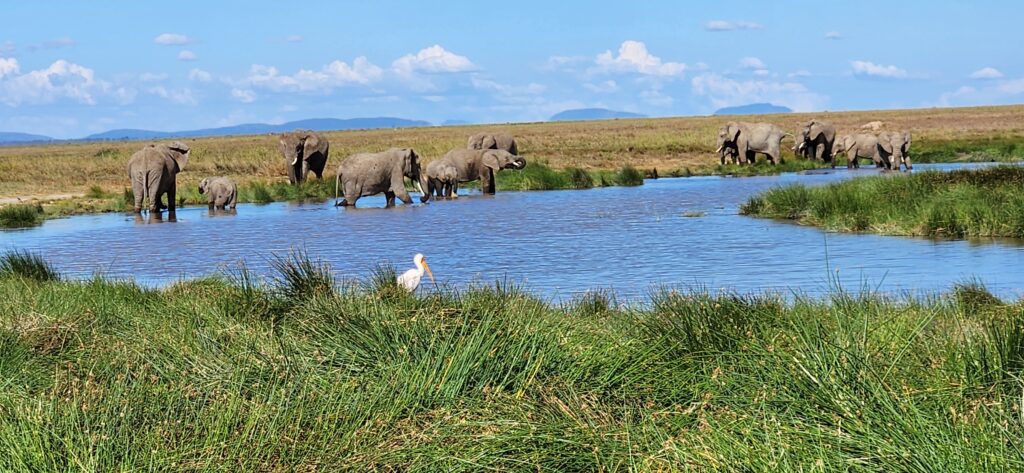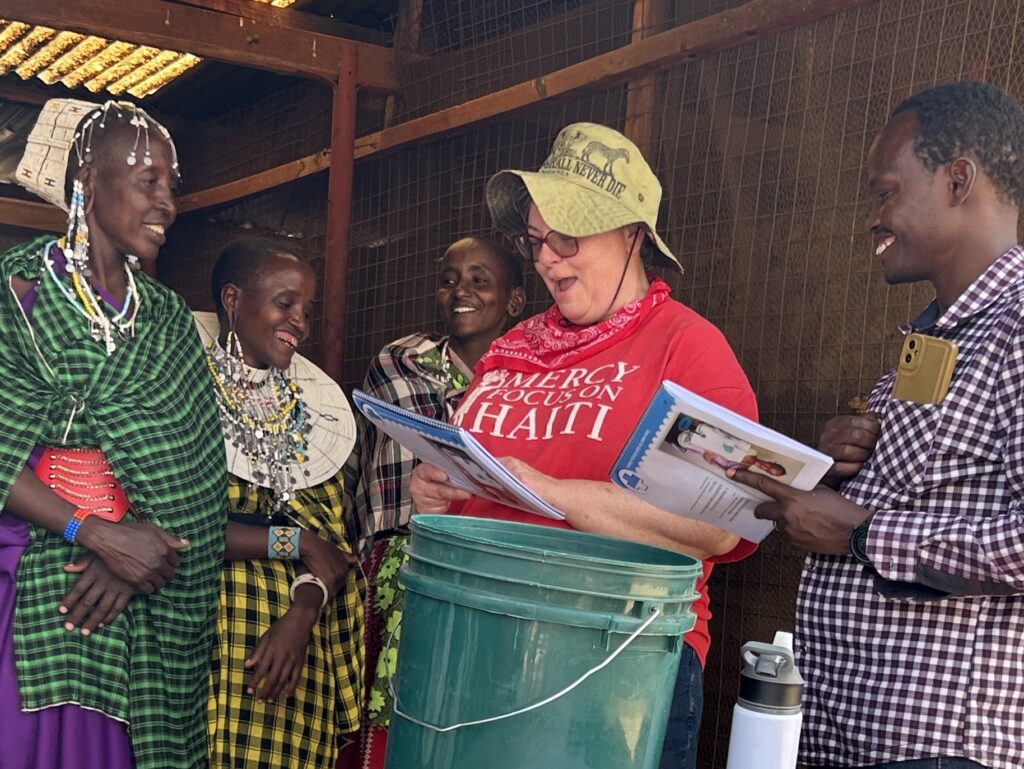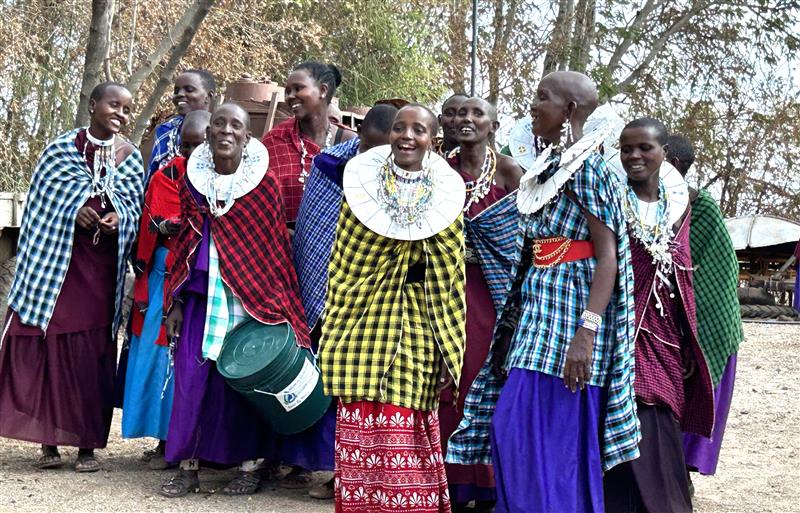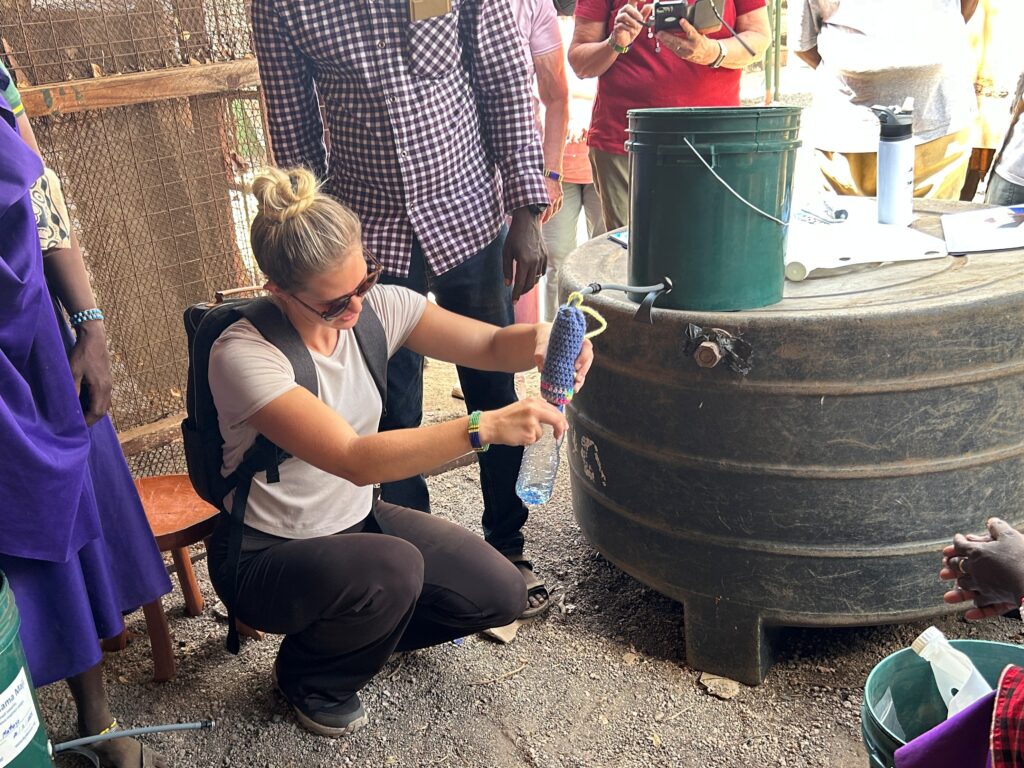By Catherine Walsh, Senior Writer
To celebrate the 2025 Season of Creation (September 1-October 4) and the 10th anniversary of Laudato Si’, Pope Francis’ encyclical on the environment, we are sharing stories about ongoing efforts to care for the Earth. Here we highlight a project led by two sisters to raise funds for a reservoir in a Maasai village, and their trip to Tanzania with parishioners from Western Pennsylvania to visit the site.
The Maasai people have lived for centuries in harmony with nature in Tanzania. But the people and the fragile ecosystem have been threatened by climate change, drought and development, making water a scarce commodity. In one village, elephants had taken over a watering hole, chasing away the women and making their 10-mile roundtrip walk to collect water for their families more difficult.

Sister Tina Geiger, RSM, and Sister Marian Wehler, OSB, heard about the trouble and were moved to do something.
Water was, and is, a central part of their environmental justice ministry. So are the needs of women on the margins and the fragile planet. The sisters are familiar with Tanzania from Sister Marian’s years of teaching at a seminary there in the 1980s and from a visit they made together to the country a few years ago for the seminary’s 50th anniversary.
As co-directors of Catholic Rural Ministry in Oil City, Pennsylvania, a former petroleum boom town in the rolling Allegheny foothills, they have long promoted Pope Francis’ Laudato Si’ encyclical on the environment in the 16 parishes and four Catholic grade schools they serve. They rejoiced when the Sisters of Mercy announced an international campaign for clean, potable water on World Water Day on March 22, 2023.
A short time later, they received a phone call from their friend Saningo (“San-IN-go”) Milliary, who had worked with Sister Marian at the Tanzania seminary, asking them to help raise funds for a new reservoir in his village, which would save the women from dangerous encounters with thirsty elephants. It would also free up the men who would no longer need to accompany them and ensure their safety at the expense of their own work of cattle grazing and farming.

“We wanted to help,” said Sister Tina, a member of the Sisters of Mercy of the Americas. “It seemed meant to be, as we wanted to respond more deeply to the ‘Cry of the Earth’ and the ‘Cry of the Poor’ as Laudato Si’ calls us to do.”
Sister Marian, a Benedictine Sister of Erie, spent years in Tanzania which gave her “a deep love” of the Earth and its most marginalized people. “Once you realize you have been privileged to experience clean water, you must help make this resource available to everyone.”
Their Earth Day school visits in 2023 focused on the plight of the Maasai women and the Mercy campaign for the right to clean water for people worldwide. Enthusiastic students collected $1,300 for what became the Life-Giving Water Project. Adult parishioners and other supporters helped the community raise over $7,000 by October.
With those funds, digging of the new reservoir quickly got underway and the Maasai village had water by late 2023.

Experiencing Tanzania
Moved by the impassioned response to the water project, Sisters Marian and Tina had an idea: Why not take parishioners to Tanzania to see the project they helped bring to life and meet the Maasai people who benefitted? Participants could then share their experiences and the culture with others. Sister Tina called the program “missionaries in training” or M.I.T. Notices in church bulletins helped generate interest in the immersion trip that took place November 8-23, 2024.
Among the nine lay participants was Madison Weaver, who loved the sisters’ Earth Day presentations when she was in grade school, and went on to earn a public health degree and dreamed of working in Africa. Another was Barbara Feroz, a sociologist and grandmother who once thought the life of a missionary sister in Africa was her calling.

As they prepared for their trip, they learned about Water By Women (WBW), a Kentucky-based nonprofit founded by Ursuline Sister Larraine Lauter, that has trained women in nearly 50 countries in the life-saving use of water filters. (Nearly 1,000 children still die every day as the result of drinking dirty water.) The group raised money for water filters to bring to Tanzania and Madison learned how to use them and train others in their use.
With Saningo acting as a translator and guide, Maasai people in colorful garb welcomed the American travelers with songs, dances, gifts and prayers.
Priests and an auxiliary bishop who were once students of Sister Marian’s joined local sisters in providing hospitality and feasts of African food for their guests. They experienced moving visits to a school that enabled Maasai girls to avoid childhood marriage, and a program for orphaned and abandoned children. They also toured smaller villages and visited the Serengeti and Tarangire National Parks, where they watched with awe as elephants, zebras and other wildlife flourished in their natural habitat.
But the highlight of the visit was seeing the new reservoir, and training 20 village women to use the water filters and see them applaud joyfully upon seeing dirty water run clean.
‘Mutuality and encounter’
Since returning from Tanzania, Sisters Tina and Marian, along with Barbara Feroz, have given presentations about the trip to various Oil City Deanery communities in five counties, while other participants are sharing their experiences in other ways. The group keeps in touch and has held two reunions so far, with another one in the works.
“We came back more aware of what most people in the world lack and need,” mused Sister Marian. “We came back more grateful for the gift of water that our Creator has given in abundance for all.”
Smiling, she added, “We are also grateful for the elephants who are an important part of the Tanzanian eco-system and who inadvertently became the cause of our life-changing mission trip.”
For Sister Tina, the water project and Tanzania trip are all about mutuality and encounter, a key part of the Sisters of Mercy’s commitment to deepen relationships “in a spirit of Encuentro and embrace our identity as an intercultural, international community.”
“These experiences in Tanzania remind me anew that we are all called to be mutual stewards of the Earth and each other, especially the vulnerable among us. For that I am profoundly grateful.”
As the Tanzanian people would say, in Swahili, Asante sana, Mungu! (Thank you, greatly, God!)